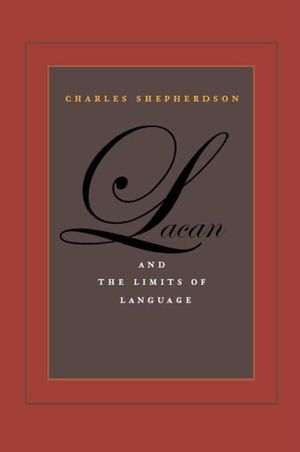Lacan and the Limits of Language
Published by Fordham University Press
“Stages refreshing encounters between Lacanian psychoanalysis and its others: Kristeva, Heidegger, Derrida, or Foucault, to name just a few thinkers.” —Ewa Ziarek, author of An Ethics of Dissensus
This book weaves together three themes at the intersection of Jacques Lacan and the philosophical tradition. The first is the question of time and memory. How do these problems call for a revision of Lacan’s purported “ahistoricism,” and how does the temporality of the subject in Lacan intersect with the questions of temporality initiated by Heidegger and then developed by contemporary French philosophy? The second question concerns the status of the body in Lacanian theory, especially in connection with emotion and affect, which Lacanian theory is commonly thought to ignore, but which the concept of jouissance was developed to address. Finally, it aims to explore, beyond the strict limits of Lacanian theory, possible points of intersection between psychoanalysis and other domains, including questions of race, biology, and evolutionary theory.
The book also engages literary texts. Antigone, Ovid’s Metamorphoses, Hamlet, and even Wordsworth become the muses who oblige psychoanalysis and philosophy to listen once again to the provocations of poetry, which always disrupts our familiar notions of time and memory, of history and bodily or affective experience, and of subjectivity itself.
“Shepherdson shows with admirable clarity, cogency and competence that psychoanalysis founds an anthropology of love, hate, desire, beauty, fantasy and memory while keeping its cutting edge in today’s discussions of war, race, sexual difference and tragedy. Thanks to him, thinking with Lacan becomes an act of enlightenment.” —Jean-Michel Rabaté, author of Lacan in America
This book weaves together three themes at the intersection of Jacques Lacan and the philosophical tradition. The first is the question of time and memory. How do these problems call for a revision of Lacan’s purported “ahistoricism,” and how does the temporality of the subject in Lacan intersect with the questions of temporality initiated by Heidegger and then developed by contemporary French philosophy? The second question concerns the status of the body in Lacanian theory, especially in connection with emotion and affect, which Lacanian theory is commonly thought to ignore, but which the concept of jouissance was developed to address. Finally, it aims to explore, beyond the strict limits of Lacanian theory, possible points of intersection between psychoanalysis and other domains, including questions of race, biology, and evolutionary theory.
The book also engages literary texts. Antigone, Ovid’s Metamorphoses, Hamlet, and even Wordsworth become the muses who oblige psychoanalysis and philosophy to listen once again to the provocations of poetry, which always disrupts our familiar notions of time and memory, of history and bodily or affective experience, and of subjectivity itself.
“Shepherdson shows with admirable clarity, cogency and competence that psychoanalysis founds an anthropology of love, hate, desire, beauty, fantasy and memory while keeping its cutting edge in today’s discussions of war, race, sexual difference and tragedy. Thanks to him, thinking with Lacan becomes an act of enlightenment.” —Jean-Michel Rabaté, author of Lacan in America
BUY NOW FROM
COMMUNITY REVIEWS
